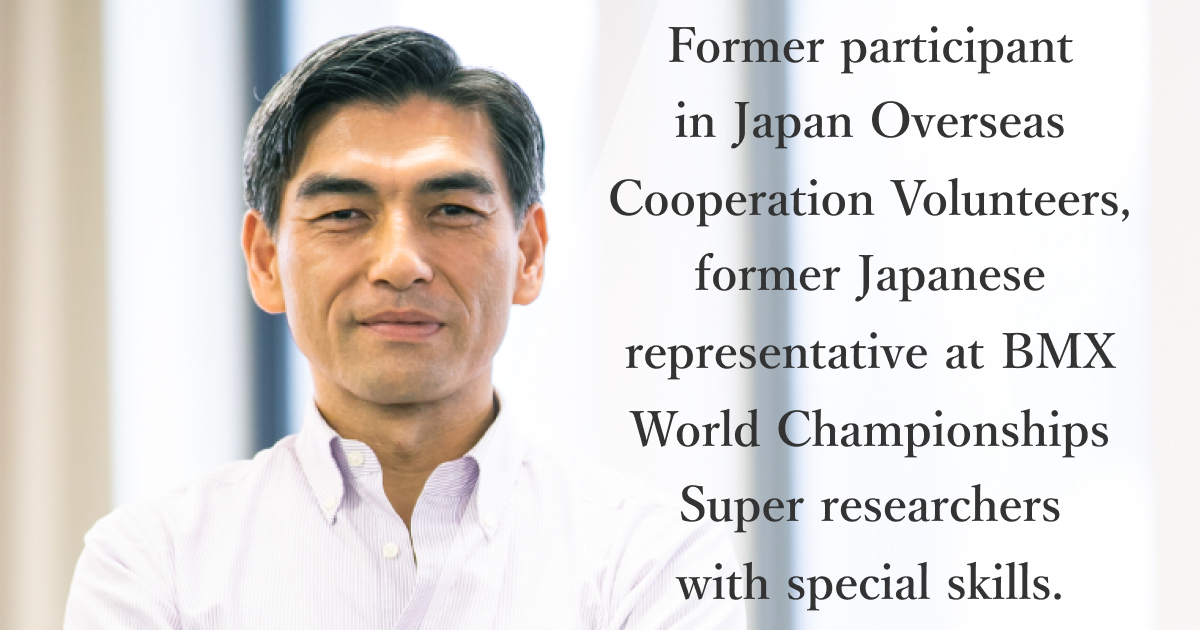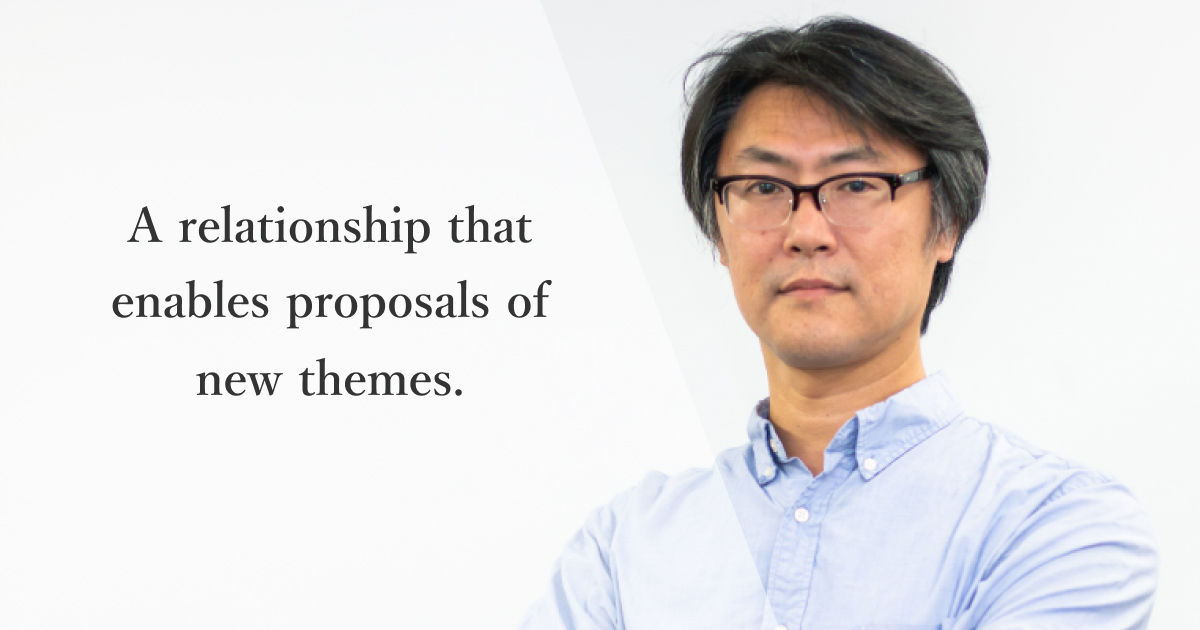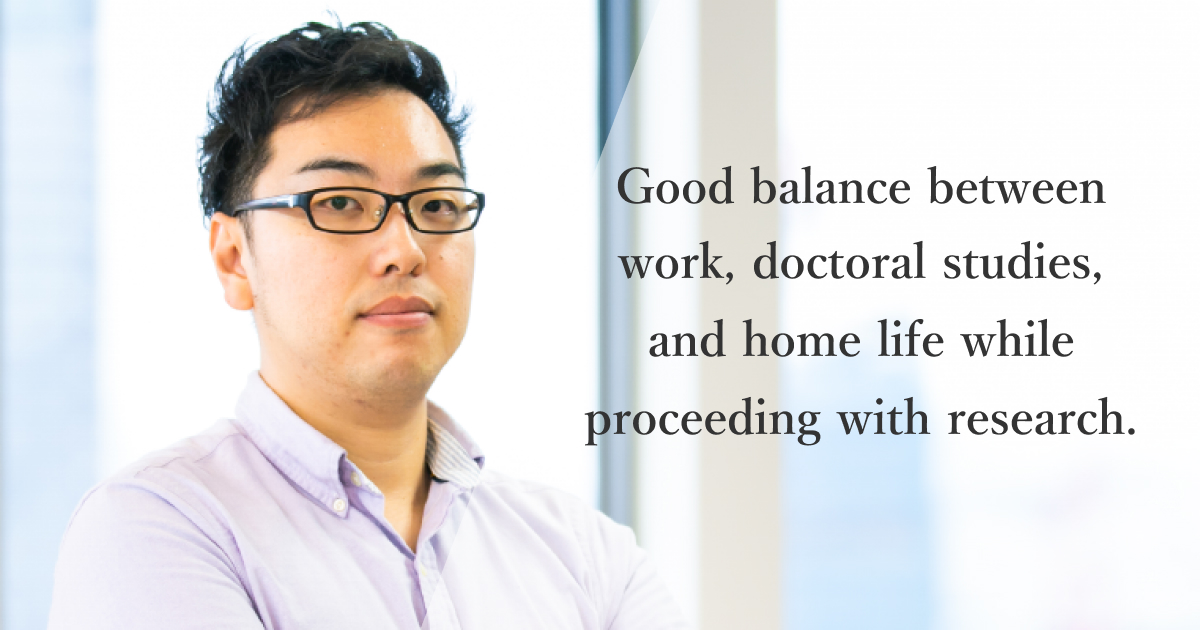Research & Development Group Principle researcher and manager
HMI
Akira Yoshizawa
Akira Yoshizawa
PROFILE
Joined company in 2002
after developing railroad management systems
for a major electrical manufacturer
Former participant of Japan Overseas Cooperation Volunteers, former Japanese representative at BMX World Championships. A super researcher with many faces.
A principle researcher and manager for the research and development group, Akira Yoshizawa is not only an R&D researcher in the fields of recognition science and user interfaces (UI), he also formerly represented Japan at the BMX World Championships and a Japan Overseas Cooperation Volunteers participant, making him a true renaissance man. On top of that, he is a father of three, and actively participates in the PTA at his children’s school. Given his unique perspective, we asked Mr. Yoshizawa about the attraction and working style of DENSO IT Laboratory (hereafter IT Lab).
Major corporate researcher→Japan Overseas Cooperation Volunteer→Japanese Representative at BMX World Championships→Researcher
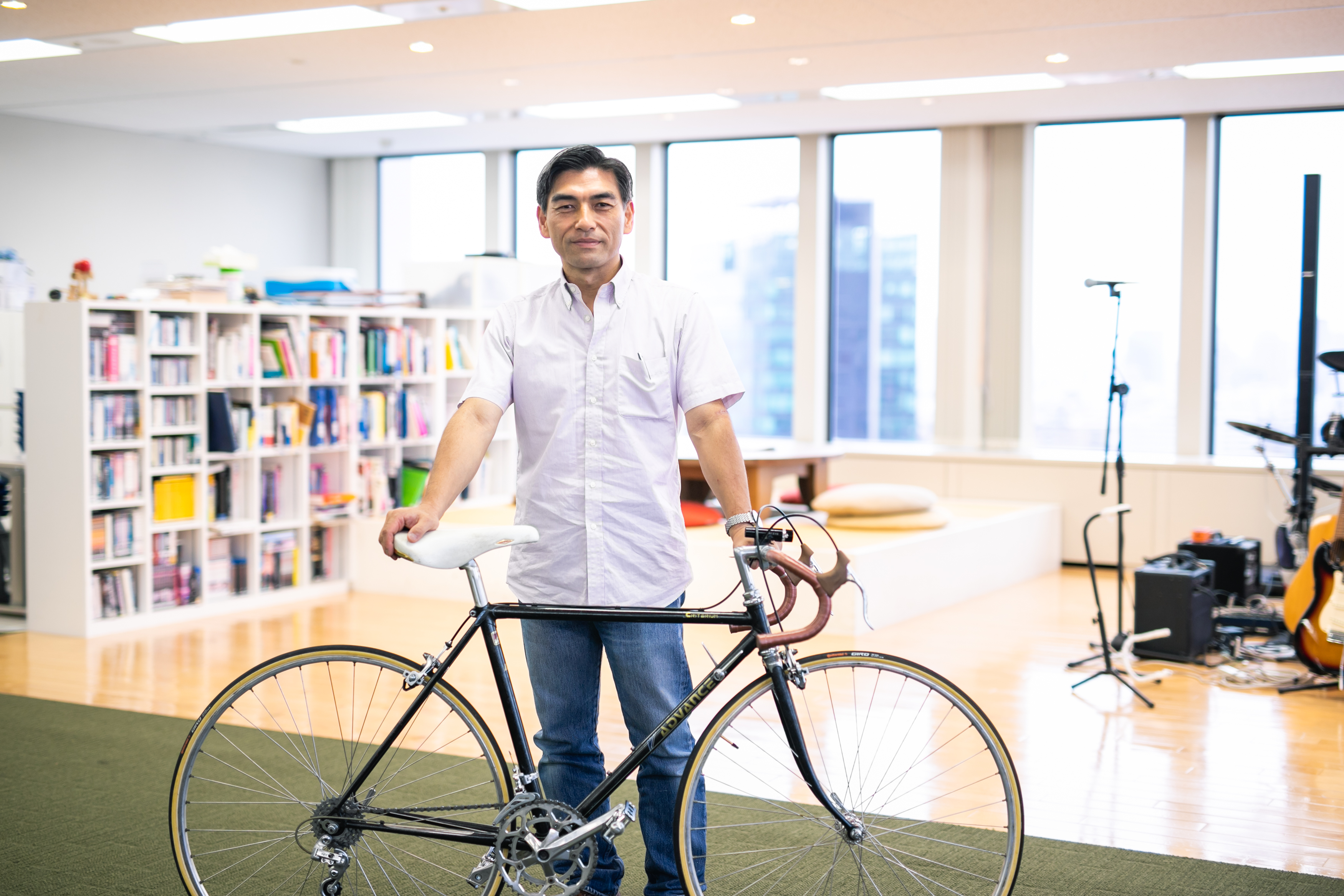
― Mr. Yoshizawa likes bicycles of all varieties and we asked about once being a Japanese representative at the BMX races.
“Recently, I’ve been more busy raising my children, so I haven’t had time to ride like when I was single, but I’ve participated in BMX races since I was in junior high. In 2005, I was a representative of Japan at the BMX World Championships in France.”
― DENSO was even a sponsor of the races, wasn’t it?
“I became a representative of Japan after I joined the company, so I was worried that I would have to take time off and that would compound my already high travel expenses. Instead, the staff at DENSO Headquarters told me “Go have fun. But in return, promote the company while you do it (Laugh).” Thanks to that policy, I received support for a portion of my costs and was able to take part in the games. During the tournament, I had a lot of hats and uniforms with the company logo on them. However, one of the logos was for “Iridium power”, DENSO makes engine plugs for cars and bikes, so some of the competitors from other countries teased me that “a bike with an engine is a violation of the rules (laugh).”
― They have a point (laugh). In addition to your love of bicycles, what kind of research are you doing now?
“I’m doing research in the field of HMI (human machine interfaces). To put it simply, we carry out research into what devices will make cars easier to use, for drivers and all passengers. A car needs to be more than easy to drive. You need to be able to confirm the safety of your surroundings, your location on the navigation system, and make a number of decisions, all of which requires a very complex interface. Our research field is how to make those functions more convenient and comfortable while also ensuring greater safety.”
― Is that a field that you’ve always been interested in?
“I’ve always been interested in cars and mobility. When I was in graduate school, I put a camera in my car and did research into recognizing distances from the car in front of me, and used images from overhead traffic cameras to recognize traffic conditions. However, the biggest direct link was… a car accident that I was in.”
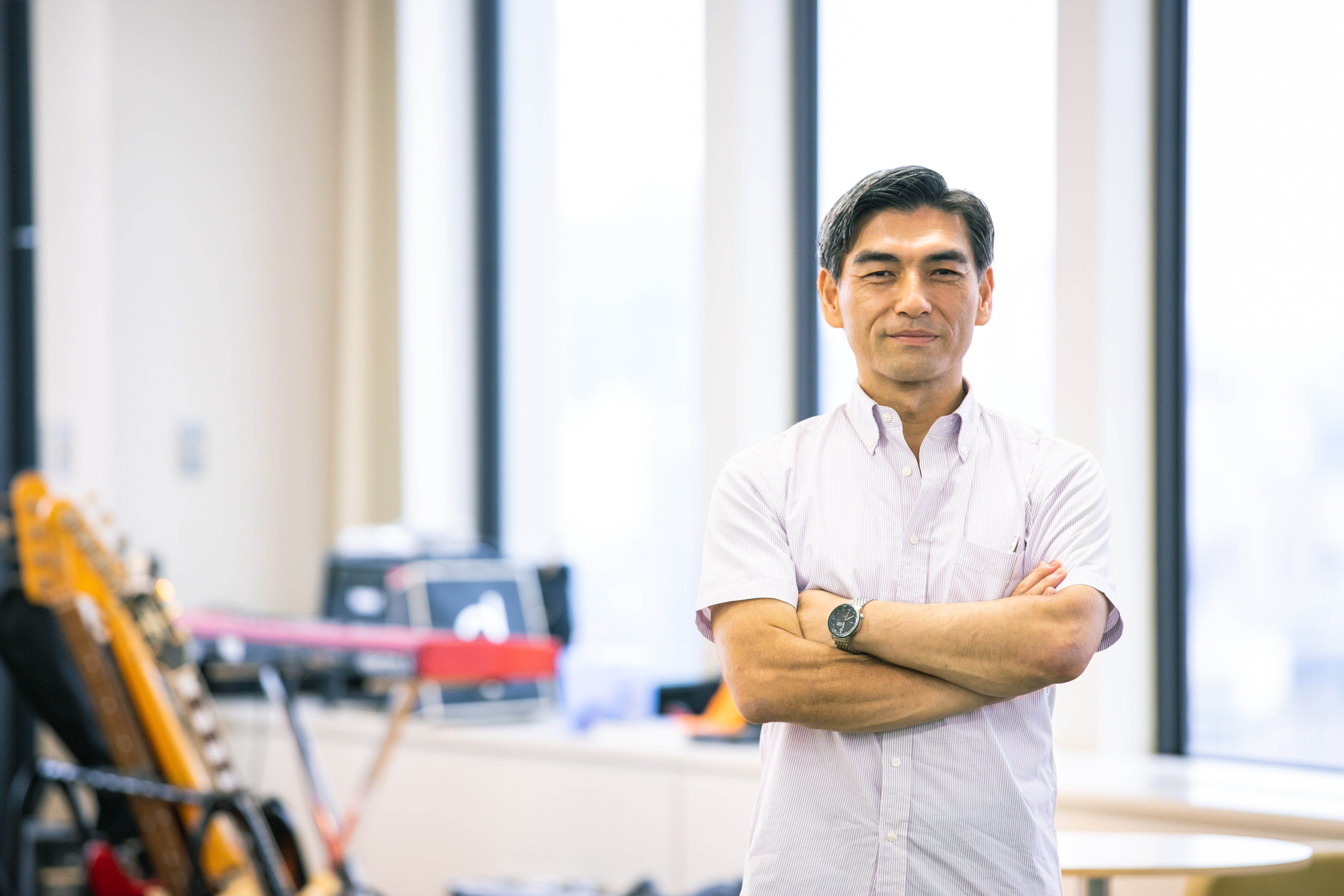
― You were in an accident! We’re glad to see you made it out in one piece.
“I worked in research and development at my previous job, too, but I wanted to learn about other countries outside of Japan. For that reason, I quit my job and participated in the Japan Overseas Cooperation Volunteers program. When the country I would be dispatched to was set and I was undergoing training to carry out the tasks I was being assigned, I was hit by a taxi.”
― !!!
“I was crossing the street at a green light, but the taxi driver didn’t notice and proceeded through the intersection without stopping, hitting me in the process. I was carried in an ambulance and in most cases, I probably would have been severely injured, but instead I came out pretty much unscathed and got away with little more than a patch on my butt. They even told me I could walk home, and so that’s what I did. I had been doing a lot of training with my bicycle, so maybe I was just in good shape (laugh).”
― What a story. How did that affect your later research?
“Because of the accident, I remembered my research into automobile safety while I was a student. At my previous employer, I wasn’t involved with cars at all. Instead, I did research and development into train traffic management systems. Still, because of my accident, I came to the realization that automobile safety actually hadn’t evolved much since my student days, and I wondered if there wasn’t more that could be done. So, after I came home from my Japan Overseas Cooperation Volunteers’ role, I began looking for work, saw the recruitment info from IT Lab, and applied for the job. I was hired, and have worked there since.”
― Still, it’s not everyday you meet someone who is a researcher, an overseas volunteer, and an international BMX rider for Japan.
“There’s no link real between the different things that I do, but being involved with and having interests in fields outside my expertise has been given me hints for my research. Since there are so many things I want to try, my life has had a lot of detours.”
Taking advantage of IT Lab’s discretionary work system to participate in PTA activities.
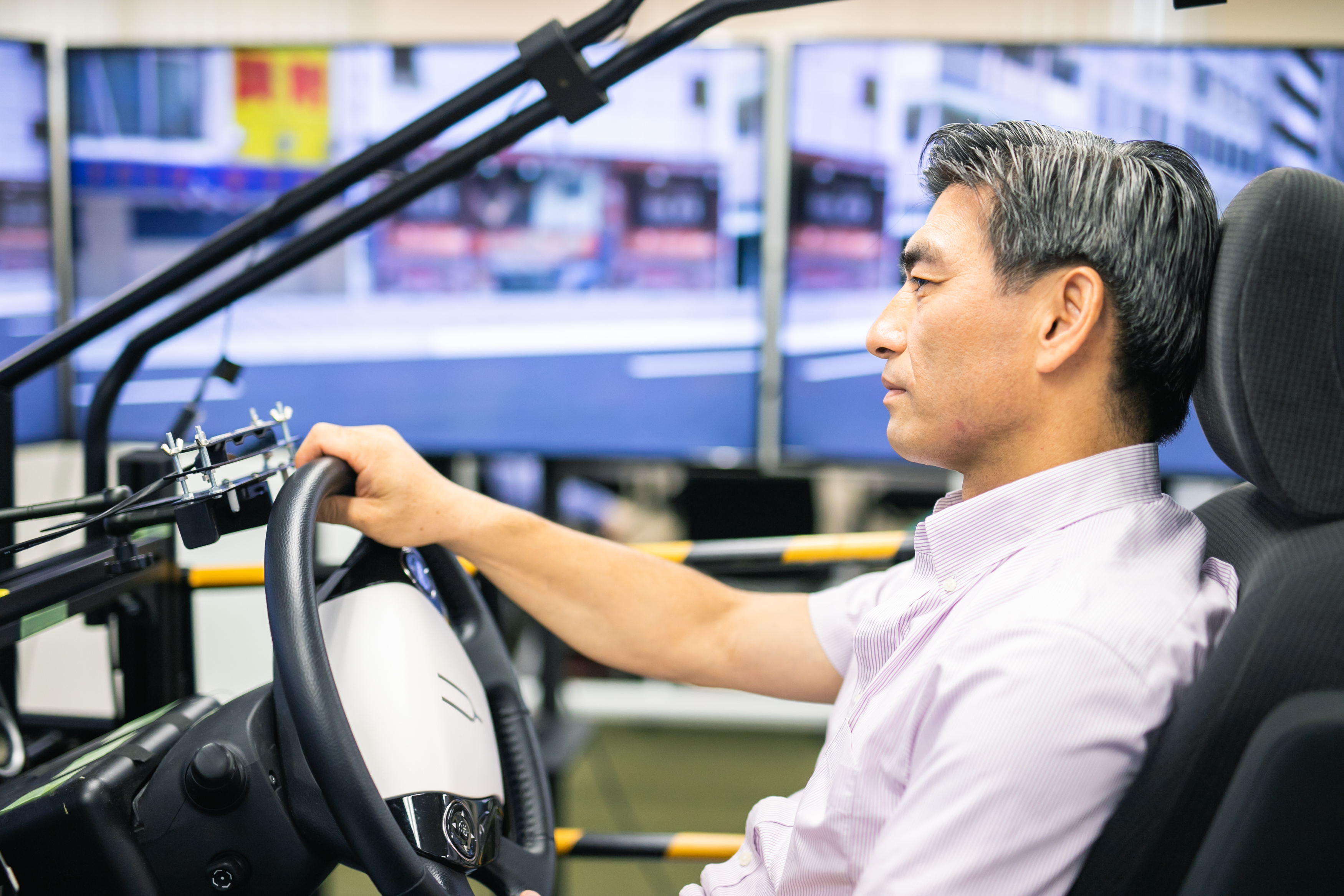
― You’re a father of three children, aren’t you Mr. Yoshizawa?
“My oldest daughter is 10 (in fifth grade), followed by my son who is six (first grade) and my youngest daughter, who is 5 (kindergarten). I’m sure your house must be very lively. With three children, there is some kind of accident almost every day and I often have to take off work suddenly, but since our company has a discretionary work system where I’m free to create my own schedule, I have the flexibility to handle everything. It’s a big help.”
― At a company, it’s usually difficult to take time off, suddenly.
“Except in the case of meetings with clients or events that cannot be rescheduled, my entire schedule is adjustable. The flexibility in work time is a huge help. It’s because of the system that I’m even able to participate in the PTA for my children’s school. I’m a library volunteer, which means I read books to the children.”
― Wow, you can even serve on the PTA. That’s amazing.
“I think that our work environment is one where it’s easy for employees with children to participate in school activities. Even when I clock in, I don’t have to be in the office the whole time. I’m able to take walks outside and visit nearby bookstores. At night, I try to have dinner with my family when possible, so I try to leave for home between 7-8 PM. On some days, I take work home with me, but that too is at my discretion. It’s easy for me to maintain balance between work and family.”
― Are you also able to take long periods off during your children’s summer and winter vacations?
“Yes. In the past, I’ve taken a whole month off during summer. Once, when coming home after visiting my wife’s family, I rode from Saga prefecture to Tokyo by myself on my bike. These days, however, I’m a manager, so I can’t be quite that selfish anymore (laugh).”
In pursuit of researcher independence
― As a manager, you have a supervisory role, so I imagine you have to give advice to other members about their research, or approve budgets. Has that meant less time for your own research, and has that bothered you?
“It’s true that I have less time, but in return, I get to share a lot of inspiration and knowledge, so I actually feel that the breadth of my research has expanded. I don’t think of it in a negative way.”
― Is your research content decided by teams? Or does each person choose on their own?
“I’m on the HMI team, but within the team and beyond it, I’m allowed to be involved with whoever or whatever I wish. In terms of what the team does, sometimes we make decisions as a group, but in general, each researcher decides for themselves and carries it out themselves. It’s a good workplace for people who have their own thoughts and opinions and want to take charge of their own work.”
― That sounds perfect for people who have fields they want to research.
“Right. I often describe what we look for as “independent researchers”. The Chinese characters for independence carry the separate meanings “standing on your own” and “setting your own standards”. For people at this company, I’d say the latter is especially important.”
― Are you allowed to research any topic you like, as long as it can ultimately be applied to automobiles?
“We have no restrictions. However, I also ask everyone to keep in mind how they want to make others happy and to look at things from that perspective. I’m sure that in the future, that will mean carrying out research that is not confined to the automotive field alone.”
― Thank you for your time and wisdom.

